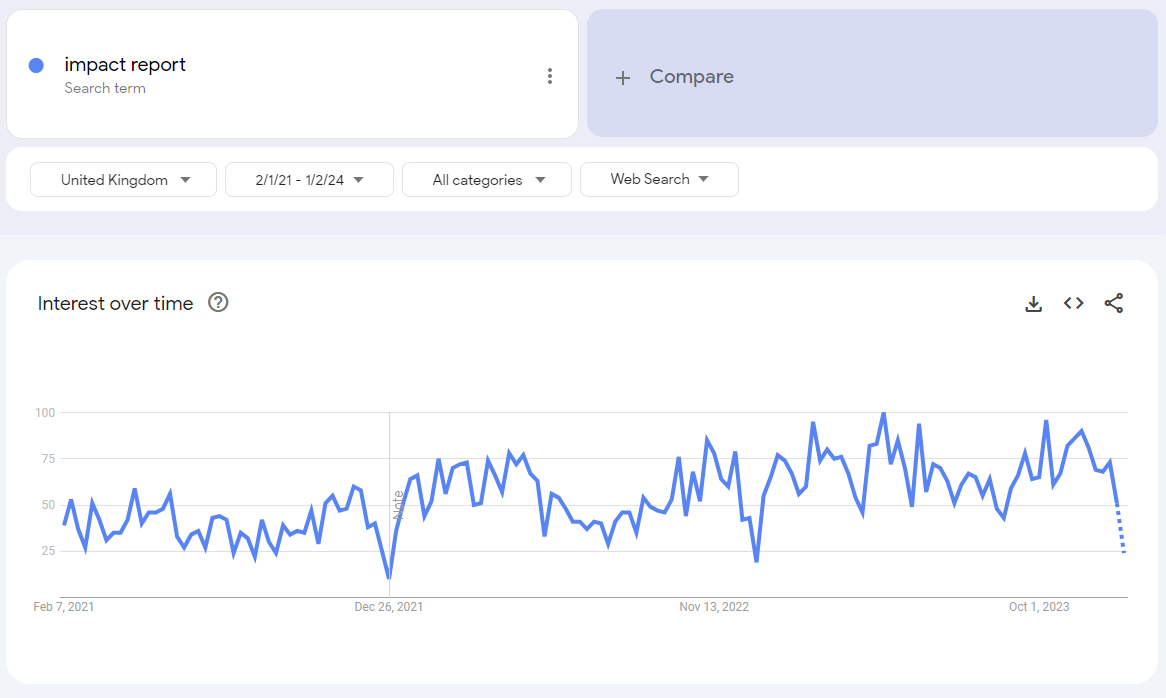What do you mean by "Impact"?
Throughout 2023, a growing number of businesses pledged to adopt more sustainable practices, fueling the rising popularity of the term "impact."
Whether it’s impact assessments, impact accounting, impact reporting or simply being “impactful”, businesses and investors want to convey their overall positive effect on people and the environment.
But are we all talking about the same thing when we say “impact”?
Or are we on a slippery slope of “impact-washing”?
Impact Definition
Without a clear definition and understanding of what is and what is not impactful, businesses run the risk of (typically inadvertantly) describing their activities as impactful when they are not.
The Oxford dictionary defines impact as:
“a marked effect or influence”.
In this definition there is no mention of whether the effect or influence is positive or negative. As with all reporting, transparency is key, so we should report both positive and negative impacts. But many businesses would instinctively understand their impacts to mean positive impacts only.
Businesses should be careful to explain exactly what activities (products, processes or business overall) are included in the scope of their definition of impact. Including positive but not negative impacts could be considered “impact-washing”.
Growing usage of Impact terms
Although the movement towards sustainable business practices was well underway prior to the Covid-19 pandemic, the use of the term impact has grown substantially since the start of 2021. Fig 1 and Fig 2 below show how google web searches related to the topic “Social Impact” and term “impact reporting” have increased drastically since January 2021.
Fig. 1: Google Trends results for the topic “Social Impact”.
Fig. 2: Google Trends results for the search term “impact report”.
So “impact” is about the effects of business activities on the people and environment with which they interact, but when can we say a business is having a positive impact?
What counts as positive impact?
Who decides whether recycling 60% of your office aluminium cans, or a 50:50 gender split is making a positive difference or not?
Recycling
Taking the recycled cans example, first we need to think about the effects of recycling cans. Recycling still involves transporting the waste, sorting and re-processing, all of which will leave a carbon footprint.
The logical step to take next is whether recycling is better than other alternative disposal options. When it comes to carbon footprint, recycling aluminium is far less carbon intensive than sending to landfill or incinerating when you consider the fact that recycling also avoids the emissions associated with extraction and production of raw materials. We also do not leave behind solid pollutants which may have other damaging effects on the natural world beyond carbon emissions.
So, we may reasonably conclude that recycling aluminium cans has a more positive impact than landfill or incineration, but what if every other office is recycling 100% of their cans? Can you say that your business is having a positive impact?
I would be very cautious to do so.
One of the key nuances of impact vs outcomes is the comparison to business-as-usual.
If the typical office in your area recycles 100% of their cans, then your 60% may be dragging other businesses down by reinforcing negative behaviours around recycling. That’s not to say that the 60% of cans that are recycled are not having a positive impact vs alternatives, but it would be wrong to describe your business’s waste management activities as having a positive impact. This is because by stating your business’s waste management activities, you would implicitly be including the 40% of cans that were not recycled by you, but that would have been recycled at an equivalent business.
If others are recycling 10%, then your business’s impact could be quantified as being equal to the difference between your recycling rate and the average comparable recycling rate (or difference between your equivalent carbon lifecycle savings and average).
It is obvious that there are many ways to go about measuring and quantifying impact. This is why evidence and explanations of methodology are important. Regulation and industry frameworks are prescriptive towards measuring emissions but not yet as much towards measuring impact.
In summary, to determine your business’s impact:
1) conduct an assessment to determine the most significant activities of your business in terms of external effects on stakeholders (both positive and negative). This is typically done using a materiality assessment
2) research literature or read publications from industry bodies and competitors to determine the typical methodology for quantifying the effect on external stakeholders of the activities identified
3) determine benchmarks for what constitutes business-as-usual, and compare your activities (and their resulting impact) vs these benchmarks
What is impact-washing?
Impact-washing is a subset of greenwashing whereby the (generally positive) effects of a process, product, system or entire business are overstated or misrepresented. A clear explanation of what exactly you are determining the impact of, what you are comparing against and well-evidenced, reputable methodology is the best way to avoid impact-washing.
Conclusion
The term 'impact' has gained traction, yet its definition and implementation remains abstract. Without a comprehensive understanding, there's a risk of 'impact-washing,' glossing over negative effects of business activities on the environment and other stakeholders. Determining true positive impact requires a nuanced evaluation, considering industry norms and context. To gauge a business's impact, transparency, adherence to industry standards, and contextual assessments are vital. Embracing evidence-based methodologies is the starting point and foundation for driving genuine positive change in your journey towards sustainability.
For expert guidance in navigating impact reporting and understanding your business's true impact, contact me at enquiries@evolvconsultants.co.uk.
My tailored approach aligns with industry best practices, ensuring an accurate portrayal of your business's impact.


